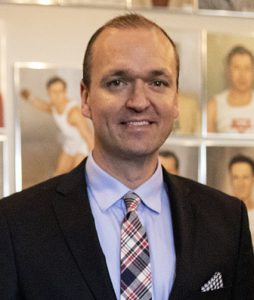USHA Mission Statement To Organize, Promote and Spread the Joy of Handball...The Perfect Game.
USHA Mission Statement: To Organize, Promote and Spread the Joy of Handball…The Perfect Game.
 Matt Krueger, Matt Krueger,Executive Director |
Welcome to the United States Handball Association (USHA), the National Governing Body for the sport of handball. The USHA is a 501 (c) 3 non-profit corporation, dedicated to the growth and development of the sport for all age levels.
As the governing body, the USHA is responsible for administering and sanctioning over 100 tournaments per year, including our National Championships in one-wall, wallball, three-wall and four-wall. The USHA also publishes Handball Magazine, a quarterly national publication dedicated to tournament coverage, player interviews, health and instructional articles and all things for the sport. We also provide a weekly e-newsletter
A brief history of our sport in the U.S.: Handball’s first true national championship took place at the Los Angeles Athletic Club, staged in 1919 by the Amateur Athletic Union (AAU) and was won by “Murder Ball” Bill Ranft. The AAU continued its reign on handball until 1951 when Chicago developer and handball aficionado Bob Kendler founded the USHA. This was a big move to break away, but handball players banded together to form a strong association with uniform rules and court regulations. The newly founded USHA would be known as the “players’ fraternity.”
Mr. Kendler served as the association’s only president until 1982 when he met with personal financial difficulty and poor health.
Once again, handball players rallied, this time behind the leadership of Carl Porter, to jump start the ailing association and move the national headquarters to Tucson, Ariz. Porter helped establish an elected Board of Directors, shifting to a democratic governance for the association, providing players with a stronger voice and representation.
Porter served as president until 1993 and had the USHA in strong financial shape, thanks to new fundraising programs. From the initial “Save Handball” campaign (which was renamed to the “Alive and Well” campaign), the USHA moved toward promotion of the game with the Development Fund. The Development Fund would provide handball programs, schools and rec centers balls, gloves and eye guards—everything a player would need to play handball. The Development Fund was rebranded to “First Ace” in 2009, and has continued to provide equipment, travel assistance and annual grants to established and budding programs.
Since 1984, over $1,000,000 has been donated for the growth of handball. Proud of the game’s rich history, handball players came through again when called upon to support the Capital Campaign for the Handball Hall of Fame Museum in Tucson, where the game’s great players are honored. Each Capital Campaign contributor is honored in the museum’s Founder’s Wall.
The USHA today: The non-profit United States Handball Association is really all things to all its members since it is the only association of its kind for the sport, servicing men, women, and juniors from novice to the professional level.
For the past 70 years, local, regional and national tournaments have been sponsored by the United States Handball Association, and over the years, a strong network of handball players and administrators has been developed. Currently, the organization is represented by 50 State/Area Chairs and 9 Regional Commissioners. The goal is to have competitions each year at the state, regional, and national level for both singles and doubles for men, women and children from 9-and-under to 85-and-over. Additionally, competition is held in numerous ability classes, including Novice.
Currently the Association has over 4,000 members. The national office is located in Tucson, Arizona. The Board of Directors consists of 15 elected officials and an emeritus position held by Carl Porter.
Handball is easy to learn but challenging to master. While we are very proud of handball’s rich tradition including the camaraderie and competition we share, handball players are most proud of our “Perfect Game.”
Matt Krueger
